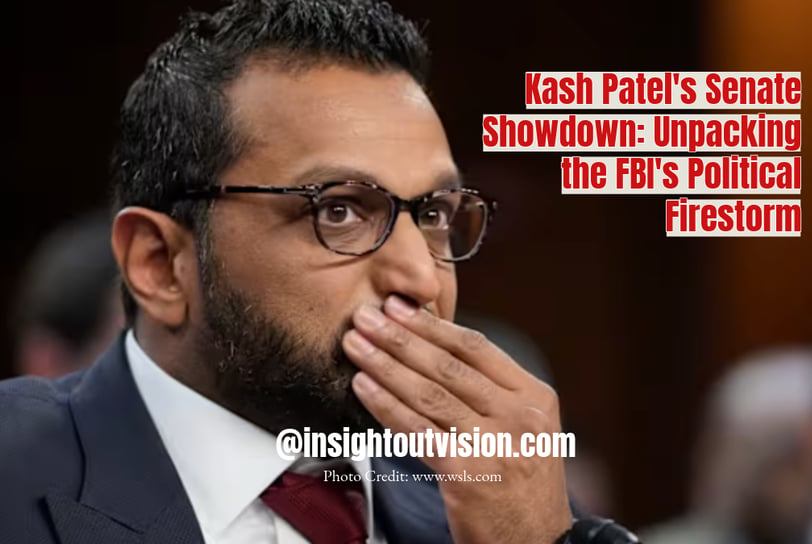Kash Patel's Senate Showdown: Unpacking the FBI's Political Firestorm
5/9/20253 min read


Kash Patel's Senate Showdown: Unpacking the FBI's Political Firestorm
Category: Deep Dive
Sub-category: Behind the Headlines
In a recent Senate hearing that has sparked widespread debate, Kash Patel, the newly appointed Director of the FBI, found himself at the center of a heated exchange with a Democratic senator. The clash, framed by social media and conservative outlets as a decisive moment of leadership, offers a window into the ongoing battle over the FBI's role, resources, and perceived impartiality in American politics. Let's dive into the details, analyze the implications, and consider what this means for the future of the bureau.
The Scene: A Senate Hearing Under Scrutiny
The video, shared by the account "Trending Politics," captures a moment where Patel responds to questions about the FBI's resource allocation and allegations of politicization. The Democratic senator raises concerns about potential cuts to local law enforcement partnerships and the reassignment of FBI agents for what she perceives as political reasons. Patel counters with a robust defense, citing concrete achievements like the seizure of over 3,000 firearms and 820 kilograms of fentanyl, and emphasizing the FBI's commitment to non-partisanship.
The exchange is not just about policy; it's a clash of narratives. The senator's line of questioning suggests a fear that the FBI, under Patel's leadership, might be deviating from its mission, potentially targeting political enemies rather than focusing on national security. Patel's response, however, paints a picture of an agency actively combating crime and maintaining its integrity, despite what he describes as "wildly inaccurate" accusations.
The Backstory: Patel's Controversial Rise
To understand the gravity of this moment, we need to consider Kash Patel's background. Appointed by President Trump and confirmed by a narrow Senate vote of 51-49, Patel is no stranger to controversy. His past includes representing Trump in matters related to the National Archives and founding The Kash Foundation, a nonprofit aimed at supporting participants in the January 6 Capitol attack. These actions have fueled perceptions among critics that Patel is part of a broader effort to "weaponize" federal agencies against political opponents.
Patel's appointment came amidst a backdrop of Republican allegations that the FBI has been biased against conservatives, a narrative supported by claims from former FBI employees and congressional investigations. This context frames the Senate hearing not just as a policy discussion, but as a battleground for competing visions of the FBI's role in American democracy.
The Broader Implications: A Divided FBI?
The hearing raises critical questions about the FBI's future. Is the bureau being steered towards a more politically charged mission, or is Patel's leadership a necessary corrective to past imbalances? The senator's concerns about the reassignment of agents and the potential for retribution hint at a fear that the FBI's independence is at risk. Patel's retort, however, suggests a commitment to accountability and a rejection of what he sees as unfounded attacks on the bureau's integrity.
This divide is not new. The FBI has long been a focal point in American political battles, from J. Edgar Hoover's era to the recent controversies surrounding the Trump administration. What makes Patel's tenure unique is the overt politicization of his appointment and the clear partisan lines drawn in his confirmation and early actions. The hearing, therefore, is less about the specifics of resource allocation and more about the symbolic struggle over the FBI's soul.
Public Perception and Media Framing
The way this hearing is framed by media and social platforms is telling. "Trending Politics" labels the senator as "whining," a term that dismisses her concerns and positions Patel as the decisive leader. This framing aligns with a broader conservative narrative that the FBI has been unfairly targeted by Democrats, a narrative that gains traction in echo chambers but may not resonate with a broader audience.
Conversely, liberal outlets and critics might see the hearing as evidence of an ongoing erosion of the FBI's non-partisan stance. The tension here is not just about policy but about trust in institutions. When the public perceives the FBI as a political tool rather than a neutral arbiter of justice, the consequences for democracy are profound.
Thought Questions for Readers
Institutional Trust: How much should the public trust the FBI when its leadership is so overtly tied to political battles? Can the bureau regain its reputation for impartiality?
Leadership and Accountability: Is Kash Patel's leadership a step towards accountability, or does it risk further politicizing the FBI? What metrics should we use to judge his tenure?
Partisan Divide: How can we bridge the partisan divide over the FBI's role, or is such a divide inevitable in today's political climate?
This Senate hearing is more than a policy discussion; it's a microcosm of the broader struggle over the soul of American institutions. As Kash Patel navigates his role as FBI Director, the nation watches closely, hoping for clarity but bracing for more contention. The outcome of this battle will shape not just the FBI, but the very fabric of trust in our democracy.
Explore deep insights on current events and growth.
Vision
Truth
hello@insightoutvision.com
+1-2236036419
© 2025. All rights reserved.
